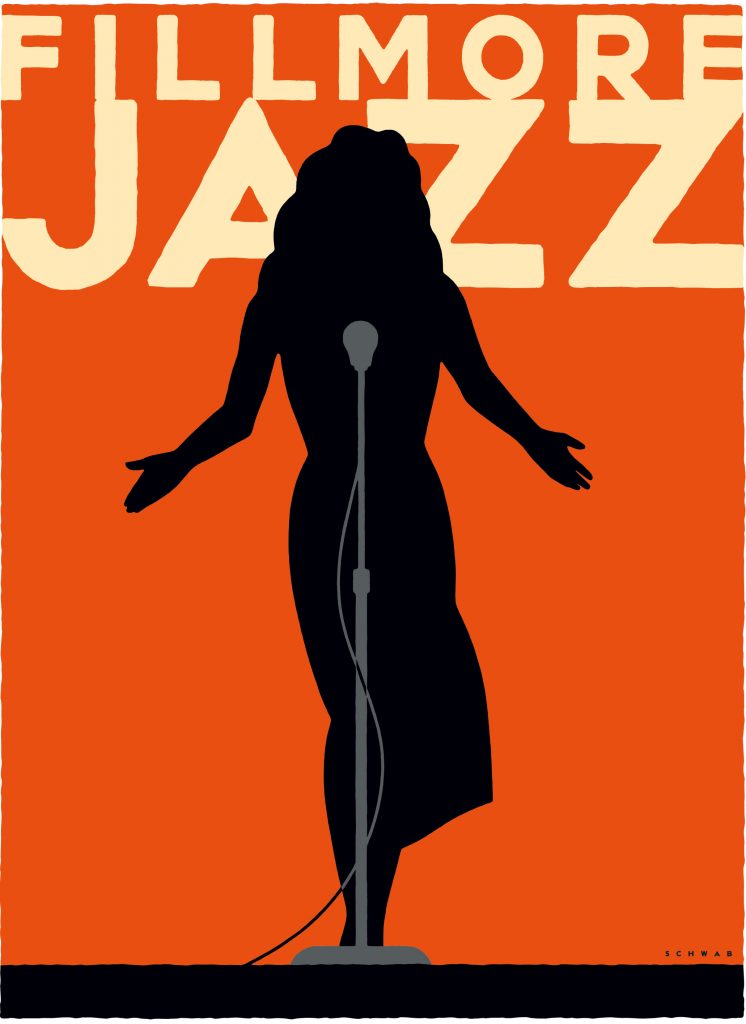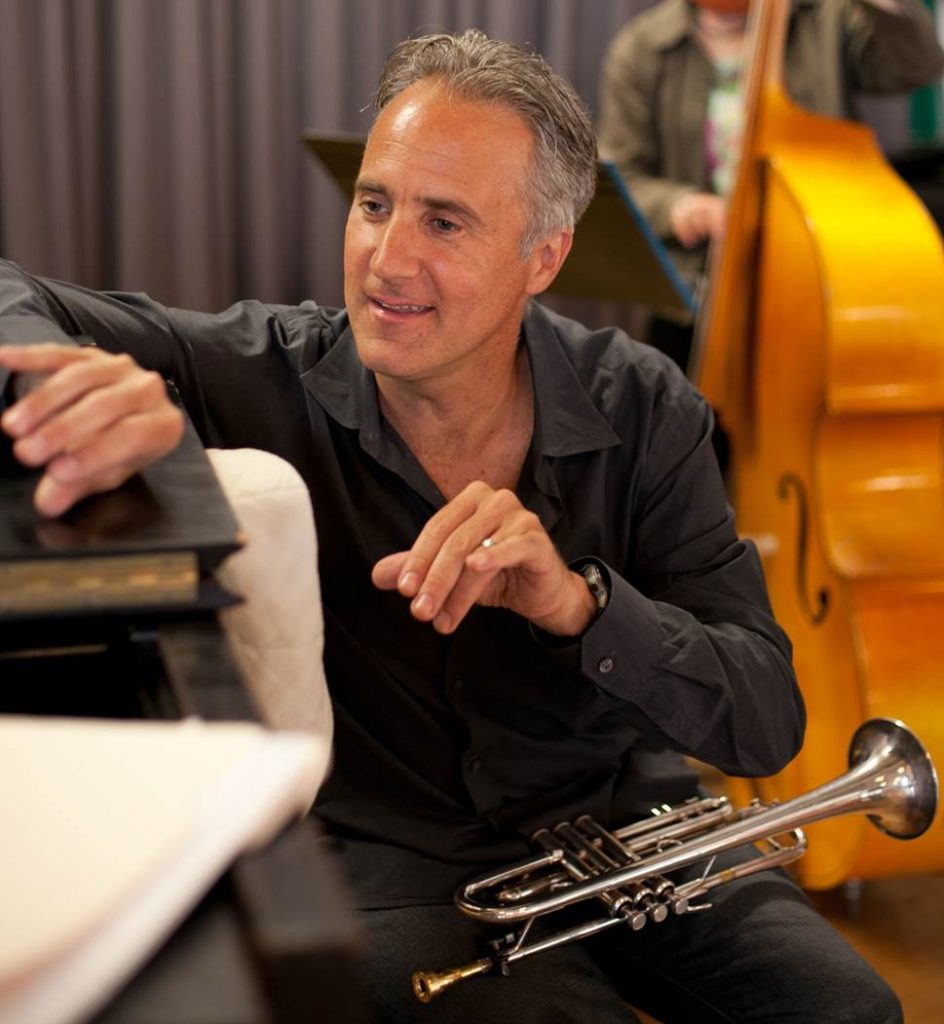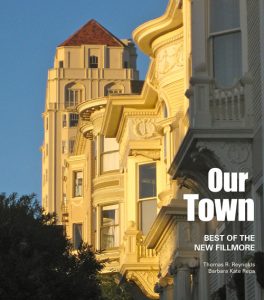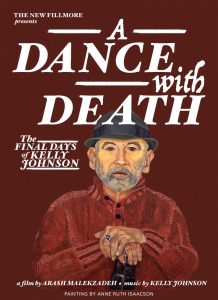By FRAN MORELAND JOHNS
The news was as mournful as the sound of taps in the distance. When word spread that widely beloved trumpeter-composer-teacher-bandleader Dave Len Scott was decamping from the Fillmore to be near his family in Arizona, there was no joy in jazzville.
But it’s true. For the first time in many years, Dave Scott will not be playing on Fillmore — nor anywhere else in San Francisco — on a regular basis.
Scott first came to San Francisco “following a girl” he’d met on a cruise ship, when he was playing trumpet in the band and she was traveling with her mother. She didn’t turn out to be The One, but he and the Bay Area were a perfect match. He has been a part of the jazz scene here since the early 1990s, founder and leader of the Trumpet Supergroup and the Dave Len Scott Jazz Quartet, pianist, composer, teacher, participant in the Fillmore Jazz Festival and jazz strolls, wandering trumpet player, improv collaborator, lecturer and cheerful innovator.
After getting his degree in music education at the University of Michigan, Scott studied jazz and trumpet performance with William Pfund, former president of the International Trumpet Guild, and picked up a masters degree from the University of Colorado in 1990. In addition to working as a classical trumpeter with the San Francisco, Honolulu, Napa and Santa Rosa Symphonies and as guest soloist with the SF Sinfonietta Orchestra, he toured and recorded with Boz Scaggs, Rosemary Clooney, Michael Feinstein, the Marcus Shelby Orchestra, among others.
In the Fillmore, he has been part of the fabric of the jazz scene. Scott is especially fond of the years he spent developing Sunday jazz services at Calvary Presbyterian Church with associate pastor David Brown, now the senior minister at Noe Valley Presbyterian. Calvary began holding Sunday afternoon jazz services, later dubbed “Live at Five,” and went all-in to explore jazz in all its manifestations, including the spiritual.
Brown and Scott collaborated on a program featuring the music of John Coltrane. “Dave found a great saxophonist, and I put together a sermon using Coltrane as the subject,” Brown says. There were weekly services featuring historical themes such as the Harlem Renaissance and various genres of jazz-inspired music.
“I found working with Dave to be one of my most gratifying ministerial experiences,” Brown says. “Dave and I became good friends — one sermon I preached was ‘An Accidental Friendship’ — and that will continue even across the miles.”
Those same years often found the Dave Scott Quartet or any of Scott’s wide-ranging assortment of musician friends performing during the regular Sunday morning service, bringing soul, blues, gospel, jazz and even Brazilian music into the traditional worship service.
“I’ve been really grateful for the support of the entire pastoral staff at Calvary,” says Scott, who often arranged as many as eight new pieces every week. The Charlie Brown Christmas services, featuring a telling of the famous story along with the Dave Scott Quartet performing Vince Guaraldi’s signature music, became a classic — and Scott has promised to return for a reprise in December.
“I am so sad to lose Dave — I have played with him almost since the beginning,” says jazz vocalist Kim Nalley. “We did a program at Calvary Presbyterian Church and we also played every Monday night for years at Jazz at Pearl’s and in Mendocino and a hundred other places. He is such an amazing, gentle and talented soul.”
Scott’s versatility and willingness to explore music in all its directions has been a perfect fit for the Fillmore and beyond.
“He’s just a valuable asset to the scene — and a wonderful musician,” says Tod Dikow, leader of the Community Jazz Orchestra, with which Scott played for years. “He can play high notes or improv, and fill dual roles.” Scott, Dickow and other leading musicians from the CJO have performed not only at the annual jazz festival, but also in trios and quartets up and down Fillmore Street during regular jazz strolls.
The musician is also something of a philosopher. “Music can bring people together,” he wrote a few years ago. “It can connect, heal, affirm. I think that is my tendency, to try to build community through music. I love jazz musicians,” he added. “They say outrageous things. They don’t hold back. They’ll go ahead and say what everyone else is thinking but is afraid to say.”
Dikow remembers a video compilation Scott once made of his colleagues, splicing together cameos of about 15 musicians saying “I love you, man.”
That also sums up the neighborhood’s collective sentiment for Dave Scott.
EARLIER: “Exploring jazz as sacred music“
Filed under: Music






